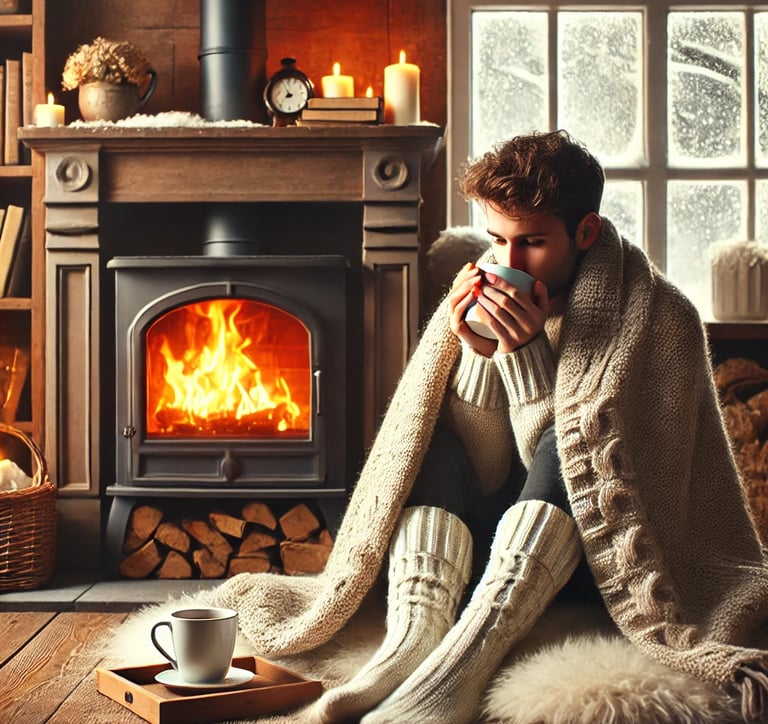Understanding Constant Chills: reasons for feeling cold and stay Warm Tips
Are you always feeling cold despite wearing layers? Discover the reasons for feeling cold, from medical conditions like hypothyroidism to lifestyle habits. Explore practical winter comfort tips and personal advice to embrace the cold season with warmth and comfort.
Dr. Rani
1/7/20254 min read


Why Do Some People Always Feel Cold Even When They’re Properly Clothed?
Have you ever met someone who is perpetually bundled up in thick sweaters and scarves, even when others are enjoying mild weather? Or maybe you are that person who always feels cold no matter how many layers you wear. While occasional chills are a part of life, constantly feeling cold can be more than just personal preference—it might be your body's way of signaling something deeper.
Let’s dive into why some people always feel cold and explore ways to address this discomfort.
1. Medical Conditions That Make You Feel Cold
Certain medical issues can interfere with your body’s ability to regulate temperature effectively. Here are some common culprits:
Hypothyroidism: The thyroid gland plays a significant role in regulating your metabolism. If it’s underactive, your body’s heat production slows, leaving you feeling perpetually chilly. Symptoms like fatigue, weight gain, and dry skin often accompany the cold sensations.
Anemia: A lack of red blood cells or hemoglobin can prevent your body from getting enough oxygen to tissues. This oxygen deficit can leave you cold, tired, and pale.
Raynaud's Disease: For some people, stress or cold weather causes the small blood vessels in their extremities to spasm. This condition can make fingers and toes icy, numb, or even discolored.
Diabetes: Poor circulation and nerve damage, especially in the hands and feet, are common in people with diabetes, causing a persistent feeling of cold in these areas.
2. Low Body Fat: Nature’s Insulation is Missing
Body fat acts like an internal blanket, helping to conserve body heat. People with low body fat—whether due to genetics, athletic build, or restrictive dieting—may lack this insulation, making them more sensitive to cold temperatures. While being lean has its perks, staying warm might not be one of them.
3. Blood Circulation: The Warmth Highway
Your blood carries heat throughout your body. If circulation is compromised, your extremities, such as fingers and toes, might feel cold despite a warm core temperature. Poor circulation can stem from a sedentary lifestyle, cardiovascular issues, or simply not moving around enough during the day.
4. Hormonal Changes: The Body’s Thermostat
Hormonal imbalances can wreak havoc on your body’s ability to regulate heat:
Estrogen Levels: High estrogen levels, particularly in women, can cause blood vessels to constrict. This reduction in blood flow might explain why women are more likely to feel cold than men.
Adrenal Insufficiency: Your adrenal glands produce hormones that help regulate stress and energy. If they’re underactive, it can lower your body’s core temperature.
5. The Role of Nutrition
Your diet significantly impacts your body’s ability to generate heat:
Iron Deficiency: Iron helps produce hemoglobin, which transports oxygen in your blood. Without enough iron, your body struggles to stay warm.
Vitamin B12 Deficiency: Found in animal products, B12 is essential for nerve and blood health. A lack of this vitamin can cause cold sensations and fatigue.
Inadequate Caloric Intake: Your body needs energy to produce heat. If you’re skipping meals or consuming too few calories, feeling cold might be your body’s way of conserving energy.
6. Age, Gender, and Genetics
Aging: As we age, our metabolic rate slows, and our circulation may become less efficient, making older adults more prone to feeling cold. Additionally, their skin becomes thinner, reducing natural insulation.
Gender Differences: Women tend to feel colder than men due to lower resting metabolic rates and hormonal fluctuations. A woman’s body is designed to maintain warmth in vital organs, sometimes at the expense of extremities.
Genetics: Some people are simply wired to be more sensitive to temperature changes. If your parents are always bundled up, you might have inherited their chilly tendencies.
7. Psychological and Environmental Factors
Anxiety and Stress: When you're anxious, blood flow is often directed to your core organs to prepare for a "fight-or-flight" response. This can leave extremities feeling cold. Chronic stress can amplify this effect.
Environment Sensitivity: People raised in warmer climates may find even mild cold temperatures unbearable, as their bodies aren’t acclimated to cooler weather.
How to Stay Warm and Manage Feeling Cold
If you’re someone who often feels cold, here are some practical steps to help:
Layer Wisely: Use thermal layers and materials like wool or fleece to trap heat. Don’t underestimate the importance of wearing socks and gloves indoors.
Boost Circulation: Engage in regular exercise to improve blood flow and generate body heat. Even light movement like stretching can help.
Eat a Nutrient-Rich Diet: Include iron-rich foods like spinach, lean meats, and beans. Add warming spices like ginger and cayenne pepper to your meals.
Stay Hydrated: Dehydration can hinder your body’s ability to regulate temperature. Warm herbal teas can be particularly comforting.
Manage Stress: Deep breathing, meditation, and yoga can help reduce the anxiety-related cold sensations.
Keep Your Feet Warm: Warm feet make a significant difference in overall body warmth. Invest in quality wool socks or use heating pads.
When to Seek Medical Advice
Sometimes, feeling cold is more than just an inconvenience. If it’s accompanied by other symptoms like fatigue, unexpected weight loss or gain, pale or bluish skin, or numbness, it’s time to consult a healthcare provider. Early diagnosis can often prevent more serious complications.
A Personal Note
As someone who has always been that "cold friend," I know how isolating it can feel to be the only one shivering at a gathering. For years, I thought it was just “how I was wired,” but learning about my low iron levels and adjusting my diet changed everything. Now, I never underestimate the power of a warm meal, cozy socks, and a good night's sleep.
So, if you're always cold, don’t ignore it—it’s your body’s way of telling you something important. Sometimes, a small change can make all the difference, whether it’s a new pair of gloves or a fresh perspective on self-care. Stay warm, stay healthy, and listen to what your body needs.
